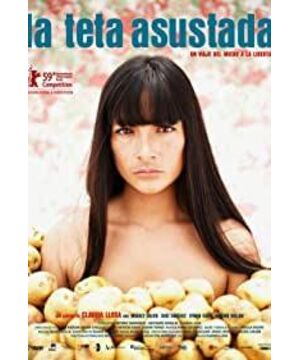"Sad Milk" is mainly about the "rape fear" that women face in a patriarchal society.
In a remote village in Peru, the mother of a young girl, Fasta, was raped by terrorists when she was young. Fasta was infected with a strange disease called "sad milk" since she was a child. The film opens with a solo account of her mother's experience of being raped during the war. The mother hums that she had witnessed her mother being raped by men when Fasta was still a fetus. Uncle said that Fasta was frightened out of his soul from birth. The genius of the director's handling is to make the audience realize that the persecution of women by patriarchy has already begun when the baby is still in the womb. Before Fasta came to the world, she realized the cruelty of women in the patriarchal society. In order to prevent her body from being violently violated, Fasta put a potato in her vagina when she grew up. The uncle told Fasta that the city they lived in was different from the war years, and now Lima is very safe and will not experience rape, and Fasta still stubbornly insists on stuffing potatoes in her vagina to prevent rape. Through this episode, the director reminds the audience that the society we live in is still a patriarchal society, and even if the domestic social order is peaceful, men's violence against women is still as serious as the war-torn years . Women are unarmed to defend themselves, and can only defend themselves through the most extreme way of stuffing potatoes in their vaginas.
In order to make money, Fasta brought her mother back to her hometown for burial and worked at Mrs. Aida's house. Fasta saw the portrait of a man in a military uniform in Mrs. Aida's house, and her nose bleeds with fright. Here it shows that the rapist of her mother is Soldiers in uniform, the army, the soldier, the soldier's saber is a symbol of male violence. Whenever Fasta is afraid, the potatoes in his body will sprout, and Fasta will use scissors to cut off the potato sprouts and hide the fear by singing. Madame Aida is a pianist, but she has been unable to create new works. Through this, the director implied that the Peruvian upper class has been unable to create viable cultural works. Aida exchanged pearls for Fasta's singing, and the performance was a great success, but Aida did not fulfill her promise to Fasta pearls, which further showed the selfishness and hypocrisy of the upper class. Mrs. Aida was able to play Fasta's tune accurately, and when Fasta heard the sound of the piano, tears overflowed her eyes. These scenes showed that Mrs. Aida must have understood Fasta's heart, but Ayi Da did not choose to help Fasta. This hints that it is difficult for women of different identities in a patriarchal society to unite. In "Roma", Alfonso used a warm way to unite the wives and maids of the upper class, and the wives of the upper class became the saviors of the maids. In fact, the relationship between Mrs. Aida and Fasta in "Sad Milk" is closer to the truth of life, and women in the upper class cannot be the saviors of women at the bottom . The person who ultimately helped Fasta overcome her fear of rape was the same male gardener as her. When Fasta first arrived at Mrs. Aida's house to help work, the foreman's servant instructed Fasta to open the door for the gardener every day before leaving get off work, which implies that the gardener may be the one who opens the door to Fasta's heart.
The female director portrays the gardener as a taciturn person who listens carefully to Fasta's words and voices; the gardener will give Fasta her favorite gifts when she learns that Fasta likes candy, daisies and potatoes, in a manner that fully respects women's wishes. On the basis of expressing his feelings, his love for women is based on respect for women . In addition to a good man like a gardener, Claudia has also created a wretched man in a patriarchal society. Fasta attended the wedding of Maxima's cousin. There was a man at the scene who was very interested in Fasta. He directly said lewd words to flirt with Fasta, but was rejected by Fasta. Ironic image. At the same time, this plot also shows that men take the words of sexual harassment of women as a way of flirting, men can't reflect that the words they say have violated women, and men's sexual harassment of women has become the norm for men and women to get along. Claudia describes to us the image of a good man in her mind through the gardener in the film . Men create the ideal woman in their mind through the film. When the woman picks up the camera, she also begins to try to shape the beautiful man in the woman's mind. This is where the film shines.
There was a dialogue between Fasta and the gardener. The gardener gave Fasta daisies and daisy flowers as gifts. Fasta asked the gardener why he didn’t give her potatoes. The man who is the subject has a different life situation than the woman who is oppressed as the object. The gardener said that only death is unavoidable, and everything else depends on personal will. This sentence points out a man's attitude towards life in a patriarchal society. Except for death, there is nothing to fear. The gardener thought that Fasta did not dare to go to the street alone because of her own thoughts. She should overcome her fear by her will, but Fasta told the gardener that women's fears are forced, and women have to face the real existence of patriarchal society. sexual violence. In the film, Fasta rarely speaks, and always walks on one side. When encountering a man, he stops or steps back in fear. The scene where Fasta met a group of men carrying new pianos in Madame Aida's garden vividly reflected the real situation of women being besieged, feared and at a loss by men in a patriarchal society. These all show that women are silent, marginalized and full of anxiety and fear in the patriarchal society.
Like a gardener, her uncle believed that Fasta's fear was caused by her own cowardice, so she covered Fasta's mouth while Fasta was asleep, trying to inspire Fasta's courage to survive and help her overcome her fear of rape. In a desperate attempt to escape, Fasta runs to Mrs. Aida's house to pick up the pearl under the photo of the man in military uniform, a plot suggesting that Fasta overcame her fear of rape in the face of death. When she finally got over her fear, she had the courage to ask the gardener to take her to therapy to get the potatoes out of her vagina. At the end of the film, the gardener sent a pot of daisies, and two potatoes were buried on both sides of the daisy stem, implying the upcoming beautiful love between Fasta and the gardener.
At the end, Fasta buried her mother by the sea, echoing the coffin with the Atlantic pattern she saw in the coffin shop, letting the sea soothe the pain of the deceased. The good thing about this film is that the daughter has never abandoned or forgotten her mother from beginning to end. She has always continued her mother's story, which shows the continuation of the history of women's own pain.
View more about La teta asustada reviews










